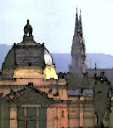 |
Vol 2, No 6 14 February 2000 |
 C E N T R A L E
U R O P E A N N E W S: C E N T R A L E
U R O P E A N N E W S: News Review for Croatia All the important news from Croatia since 7 Febuary 2000 Saša Cvijetić Stipe Mesić of the Croatian People’s Party (HNS) is the new President of Croatia. He won 1,433,299 votes or 56 per cent, whereas the other candidate, Dražen Budiša of the Croatian Social Liberal Party/Social-Democratic Party (HSLS-SDP) coalition, won 1,125,957 votes or 44 per cent in the second round of the presidential elections that were carried out on Monday, 7 February. The turnout was 60.88 per cent, which is five per cent less than in the first round and ten percent less than at the 3 January parliamentary elections. A total of 17.79 per cent of voters registered outside Croatia went to the polls. Most of them, 77.44 per cent, voted for Budiša, whereas Mesić only won 22.56 per cent of the vote. The newly-elected President Stipe Mesić said early on Tuesday morning that he would take over the current presidential powers until the envisaged constitutional changes were implemented, adding that he would not use those powers that were the result of the "inflation of presidential powers." Mesić announced his close co-operation with the Government and the Parliament. "The authorities that acted in an undemocratic manner are replaced by Europe-oriented, democratic ones that will ensure stability and welfare to all Croatian citizens," he stressed, adding that he would be a president of initiative and would not abuse his position. He also promised to radically cut state expenditure and see that Croatia acquires a European image. Croatia can join Europe only if it resolves all open questions with its neighbours to the mutual benefit, Mesić said. "I shall be the President of all citizens of Croatia," he concluded. He will be inaugurated as Croatia’s new President on 18 February. Prime Minister Ivica Račan (SDP) presented on Wednesday the Government's programme for the next four years to the Parliament’s House of Representatives. The guidelines of the programme are the following: The situation in all areas of the country's economic and social life requires full mobilisation of each individual, association, company, body of state administration and local self-government, as well as responsible, tolerant and creative work of all in the next four years. The Government will ensure a rational and fair management of tax payers' money, as well as economic development and social dialogue. The year 2000 will be the year of austerity, the year in which sound foundations for economic development and equal social development in the coming period will be laid. Priorities in capital investments will be re-examined. The Parliament gave a vote of confidence to the Government and supported its programme for the next four years. The Government‘s programme was not supported only by the main opposition party, the Croatian Democratic Union (HDZ). The Zagreb District Court decided to prolong the detention of Miroslav Kutle for one month. Kutle was arrested last week under accusation of serious financial fraud, which deprived the company Tisak of DM 12 million . The hearing of witnesses is scheduled for next week. Acting President of the HDZ, Vladimir Šeks, offered his resignation from that duty and stated that he will not be a candidate for the chairmanship at the party congress to take place in April. The Presidency did not accept his resignation, which was not the case with the resignation of the General Secretary Drago Krpina, who was replaced by Joso Škara. Šeks explained his resignation by his feeling of responsibility for the failure of the party in the elections and the rifts within it. He said that no member from the current Presidency should become the President of the Party after the Congress. Mate Granić, the HDZ’s candidate at the presidential elections in January, denied that he was working on establishment of the new political party. Head of the Croatian Intelligence Service (HIS) Miroslav Tuđman asked the Acting President of the Republic Zlatko Tomčić on Friday to release him from his duty as soon as possible. Tuđman (the son of late President Franjo Tuđman) explained that he decided to resign even before the inauguration of the new President because he feels appalled by the statement of the new President Stipe Mesić to Le Monde in which he, allegedly, claimed that both Franjo Tuđman and Slobodan Milošević are responsible for the war in former Yugoslavia. Croatian Foreign Minister Tonino Picula visited Sarajevo on Friday. This was his first official visit to a foreign country. Picula decided to visit Bosnia-Herzegovina first in order to emphasise the new Croatia’s policy towards its closest neighbours. Saša Cvijetić, 11 February 2000
|
|
![]()
Copyright © 2000 - Central Europe Review and Internet servis, a.s.
All Rights
Reserved